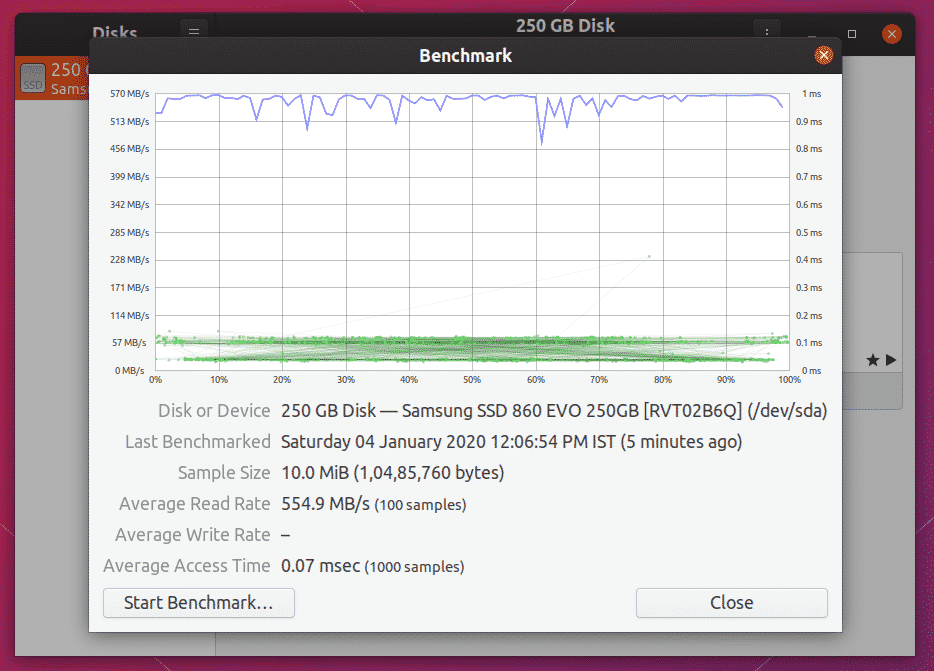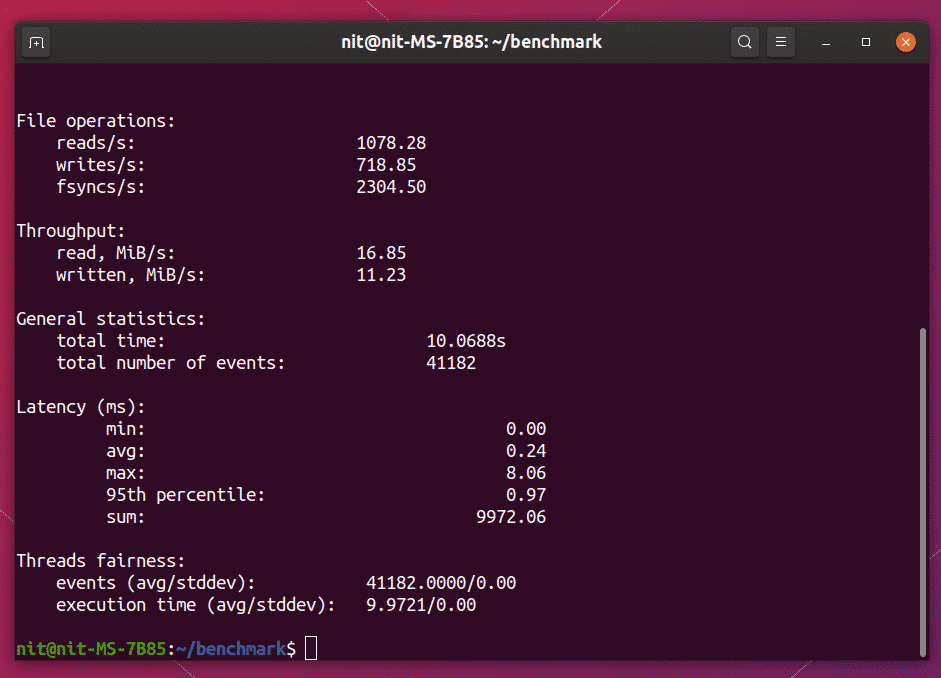Linux How Many Disks Read/write Requests Have Been Made?
Monitoring read and write speeds of storage devices is a good way to decide genuine products and determine disk health overtime. This commodity volition list various tools available for Linux that can exist used to benchmark difficult disks and monitor real time disk activity information.
GNOME Disks
GNOME Disks is an internal and external deejay direction tool for Linux. Based on udisks, it can be used to modify, format, and partition drives also as to perform benchmarks on whatsoever storage media continued to the system.
GNOME Disks comes pre-installed on nearly distribution having a GNOME based desktop environment. In example if it missing on your Ubuntu system, you can install it by running the control below:
$ sudo apt install gnome-disks
To perform a hd benchmark using GNOME Disks, launch "Disks" app from application launcher.

Click on three dot menu and and then click on "Benchmark Deejay…" option.

Click on "Outset Benchmark…" push button on the next window.

Change the options equally required. Note that the criterion utility won't let you to do write benchmarks on mounted disks. Then in order to perform a full read-write benchmark on built-in deejay, you have to launch GNOME Disks in a live USB mode and unmount the built-in storage drive. Click on "Commencement Benchmarking…" button to start the benchmarking process.

The benchmarking process will accept some to finish depending on the number of samples you accept called. Once the process has finished, you lot volition be able to see read / write speed results.

You need to compare these results with the vendor advertised read / write values to estimate the efficiency.
Hdparm
Hdparm is a unproblematic command line app for Linux that allows you to manage storage devices by setting and removing parameters. It also includes an pick to examination read speeds of storage devices.
To install hdparm in Ubuntu, run the command beneath:
$ sudo apt install hdparm
To run a hd benchmark using Hdparm, utilize the command below:
$ sudo hdparm -tT /dev/sda
Supervene upon "/dev/sda" part with the address of your hard drive. You can cheque the path using the GNOME Disks app mentioned above or by running the command below:
$ lsblk -o NAME,PATH,MODEL,VENDOR,SIZE,FSUSED,FSUSE%,TYPE,MOUNTPOINT
In one case the criterion has finished running, you will see test results as last output.

DD
Data Duplicator or but 'dd' is a command line utility for Linux that allows you to copy and catechumen files and data. It is capable of copying large chunks of data, cloning entire hard disks, creating bootable USB drives and so on.
It is possible to check hard disk write speed using dd. Run the commands below in order to perform a write speed criterion.
$ mkdir benchmark
$ cd benchmark
$ dd if=/dev/zero of=benchfile bs=4k count=200000 && sync; rm benchfile
Expect for the test to cease, results will exist shown in terminal once washed.

To perform a read exam using dd, run the control below:
$ dd if=/dev/cipher of=/dev/null && sync
This command will continue to run until stopped, then press <CTRL + C> later a few seconds to run into the results.

Sysbench
Sysbench is a multi purpose benchmark utility for Linux. Some of the benchmark options provided by Sysbench include a CPU stress exam, memory access speed test, and filesystem input output performance examination.
To install sysbench in Ubuntu, run the command below:
$ sudo apt install sysbench
To perform a hd criterion using sysbench, run the commands below ane by ane:
$ mkdir benchmark
$ cd benchmark
$ sysbench fileio set up
$ sysbench fileio --file-test-mode=rndrw run
Wait for the test to end. Once done, you will see the results every bit terminal output.

To remove the test files from benchmark directory, run the control below:
You can employ "Throughput" statistics as the performance indicator.
Sysstat
Sysstat is a command line performance monitoring app for Linux. It tin can monitor input output operations, memory consumption, resources usage by running system processes, network activity etc. and show existent fourth dimension statistics about them.
To install Sysstat in Ubuntu, run the command below:
$ sudo apt install sysstat
To monitor performance of hard deejay, y'all tin can use "iostat" command included in Sysstat. Though information technology doesn't include an choice to perform benchmark, it can prove real time data about disk read and write activity.
To run into disk read and write speeds every second, run the command beneath:

Iotop
Iotop is a "acme" tool for monitoring disk reads and writes. It shows information in a tabular form, like to what superlative or htop does for displaying resource consumption. It works similar to iostat utility mentioned in a higher place and it is non exactly a benchmark tool. However, it can brandish real time disk action statistics, making information technology suitable for monitoring large data operations.
To install Iotop in Ubuntu, run the command below:
Run the control below, to launch iotop:

Conclusion
These are some of the methods that tin exist used to benchmark hard disks and decide their read and write speeds. There is no denying that some counterfeit and falsely advertised products are available today in market place, specially flash storage products. The only way to determine their efficiency is to criterion them and compare the results with advertised speeds.
Source: https://linuxhint.com/benchmark_hard_disks_linux/
0 Response to "Linux How Many Disks Read/write Requests Have Been Made?"
Post a Comment